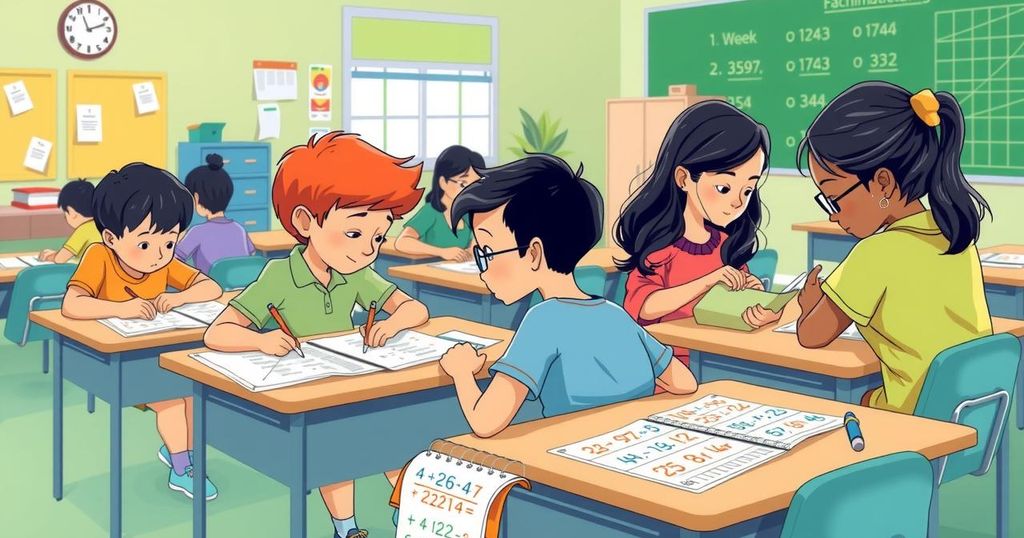Math Class as a Launchpad for Skills in an AI World
Po-Shen Loh, a math professor and founder of LIVE, argues that math class is key for developing problem-solving and interpersonal skills needed in an AI-driven world. He advocates for engaging and collaborative learning approaches over traditional methods, emphasizing the role of human teachers in education. Loh asserts that while AI can provide supplemental learning tools, it will never replace the need for passionate educators in the classroom.
In an increasingly AI-driven world, adaptability, problem-solving, and emotional intelligence are crucial skills for students to cultivate. Po-Shen Loh, a math professor at Carnegie Mellon University and former coach for the U.S. International Math Olympiad team, argues that math class is the perfect setting to develop these abilities. Loh emphasizes that education should evolve to prepare students for careers reshaped by technology and even create new opportunities that may arise.
Loh has also founded a unique program named LIVE, which hires professional performers to engage high school students in teaching math creatively to younger peers. He believes math lessons should be as captivating as the content kids scroll through on social media, making the subject more accessible and interesting. In a recent conversation with Education Week, Loh shared insights on how teachers might leverage math instruction to foster essential problem-solving and teamwork skills.
Not everyone, however, is on board with this approach. Some math teachers cling to traditional methods, focusing primarily on fundamental skills instead of incorporating interpersonal learning. Loh insists that the current educational framework needs to be shaken up to truly equip students for a future where AI is a dominant force.
So, what exactly should students grasp in math, especially with easy access to AI tools? Loh draws from his hiring experience, stating that simply coming from a well-known college doesn’t guarantee a better employee. “You need to figure out which people are good at creating things and solving problems that they’ve never encountered before,” he points out. Ultimately, it’s those who approach unfamiliar challenges with enthusiasm that stand out in the workplace.
He’s a strong proponent of engaging students in middle school math competitions. These types of problems emphasize creativity without requiring advanced knowledge like trigonometry or calculus. Students tackle questions involving fractions, logic, or geometry, engaging in a collaborative environment rather than waiting for instructions from a teacher or seeking answers through AI. “It takes a team of 20 kids who are about the same level, all discussing together,” he explains, highlighting how teamwork fosters essential skills.
Collaboration in solving math problems translates well into the workplace. Loh stresses that students learn critical social-emotional skills related to teamwork, preparing them for real-life scenarios where AI might handle the technical tasks. “One of the first things they learn is that it’s OK to voice a half-baked idea,” he notes. In a brainstorming session, waiting for a fully formed idea could leave someone out of the conversation.
While there are advantages to using AI for math instruction, Loh warns that it shouldn’t replace human teachers. “The danger is people cannot think that AI will replace the need to hire a human teacher,” he cautions. AI can be a supplementary tool, but it should never detract from the core of education, which involves human interaction and guidance. According to Loh, the value of a skilled teacher remains unmatched, especially in face-to-face learning environments.
Despite the rise of technology, Loh believes teaching will remain a stable profession. “Nobody will send their kid to a school patrolled by robots,” he says candidly. Human teachers will always hold a critical role in classrooms, even as society evolves. While the teaching landscape may shift to accommodate more applicants, the need will persist, ensuring that students receive the guidance they require.
In summary, math education needs to adapt to include critical skills that support problem-solving and interpersonal growth. Loh champions a shift towards collaborative, engaging learning environments that can prepare students for an AI-rich future, arguing that while AI can assist learning, it should never replace the invaluable role of human educators. As we move forward, the importance of nurturing these skills becomes even more apparent, ensuring that students are well-equipped for tomorrow’s challenges.
Original Source: www.edweek.org




Post Comment